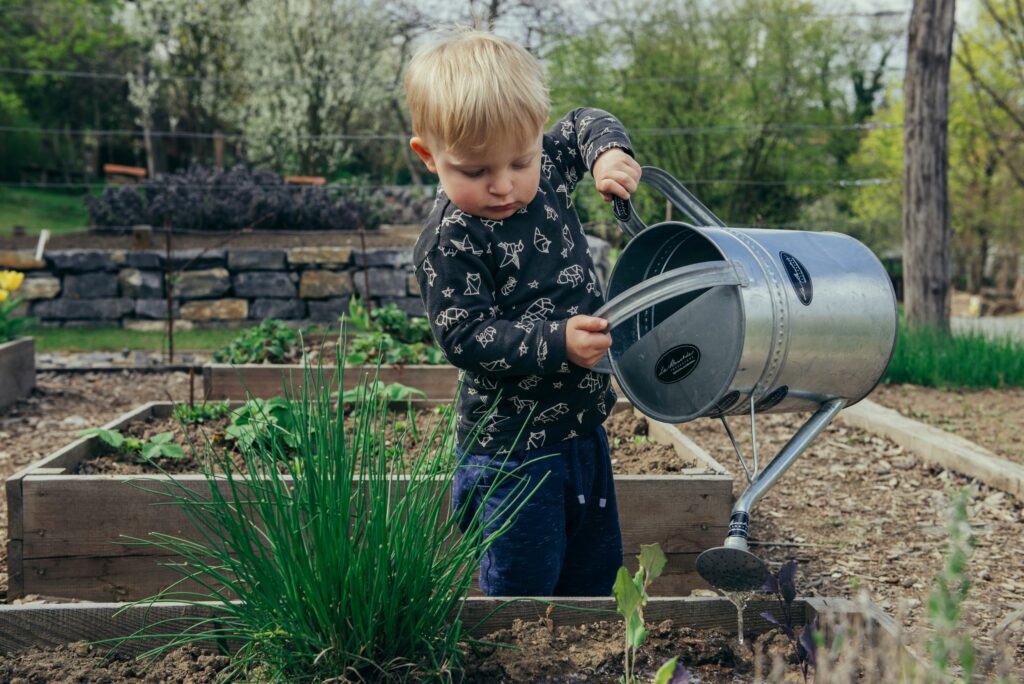EECERA Conference 2025 – Guest Blog # 24: Nature Experiences in Daycare
Posted 20th August 2025
One of a series of short blog posts by presenters who will be sharing their work at the upcoming annual conference in Bratislava, Slovakia. Any views expressed in this post are those of the author(s) and do not necessarily reflect the official stance of their affiliated institution or EECERA.
Nature Experiences in Daycare – What Daycare Managers in Germany Reveal About Outdoor Learning
By Andy Schieler, University of Applied Sciences Koblenz (IBEB), Germany

Photo by Filip Urban on Unsplash
Nature is more than a pleasant backdrop for children’s play – it is a rich educational environment that fosters motor skills, well-being, creativity, and environmental awareness. While the developmental benefits of nature experiences are well-documented internationally, far less is known about how daycare centers actually use natural spaces in everyday practice, and what professionals need to make outdoor pedagogy a reality. To address this gap, the 2025 German Daycare Management Congress (DKLK) study surveyed 2,659 daycare managers nationwide. This is the first large-scale dataset in Germany capturing both the potentials and needs of educational work in natural spaces from the perspective of those leading early childhood institutions.
What the survey found
The results reveal a striking paradox: although over three-quarters of daycare managers report that children prefer nature to indoor spaces, three-quarters also say their teams do not visit natural environments daily. Four out of ten visit less than once a week. More than half of daycare managers do not have a concept for educational work in nature, and many lack specially trained staff in this area.
When daycare centers do work in natural spaces – forests, meadows, streams, or fields – managers identify a wide range of benefits for children:
- Motor skills (91%)
- Health (84%) and well-being (82%)
- Environmental awareness (80%)
- Self-awareness (75%) and creativity (74%)
Importantly, benefits extend to professionals as well: better health, reduced noise exposure, improved child behaviour, opportunities for personal development, and enhanced well-being. These findings align with theories such as Attention Restoration Theory (Kaplan 1995) and Stress Reduction Theory (Ulrich 2023), which highlight the restorative effects of natural environments.
What stands in the way?
The two most common needs identified by managers were more staff and greater willingness among educators to take children outdoors more often. Other barriers include inadequate clothing for children or staff, limited access to natural spaces, and insufficient training. These findings suggest that structural, cultural, and professional development factors all play a role in whether children gain regular access to nature through their daycare.
Learning from nature and forest daycare centers
Nature and forest daycare centers in Germany stand out as exemplars:
- They visit natural spaces far more frequently than other centers
- They provide more diverse nature experiences
- They are more likely to have a concept for nature pedagogy and specially trained staff
Their practice offers valuable reference points for other institutions seeking to strengthen outdoor learning.
Why this matters now
The findings connect to broader educational and societal priorities. Regular access to nature supports multiple Sustainable Development Goals (SDGs) – including health, high-quality education, and sustainable cities and communities – and cultivates “future skills” such as resilience, problem-solving, and cooperation.
Given that almost all children in Germany attend daycare before school age, the design of these environments – and the professional readiness of educators to use natural spaces – has far-reaching implications for child development, educator well-being, and our relationship with the environment.
Meet the research at EECERA 2025
These findings will be presented in greater depth at the EECERA Conference in the self-organised symposium OUTDOOR PLAY AND LEARNING SIG 1: Navigating Outdoor Pedagogies: Teacher Practices, Institutional Challenges, and Evolving Contexts (Symposium Set A16 | Tuesday 26th August 2025, 13:30–14:50 | Room G244, Second Floor, Faculty of Arts). (Schedule liable to change; please refer to final programme for details).
Related publications
This blog post builds on ongoing research, including:
- Schieler, A. (2025, under review). Nature experiences in daycare. A study about potentials and needs from the perspective of daycare managers in Germany. European Early Childhood Education Research Journal (EECERJ).
- Schieler, A., Schindler, L., & Pohlmann, U. (2025, in press). Potenziale der Naturraumpädagogik für pädagogische Fachkräfte – Ein systematischer Review. In Nentwig-Gesemann et al. (Eds.), Forschung in der Frühpädagogik. Kinder und Natur im Kontext nachhaltiger Entwicklung. FEL-Verlag.
- Schieler, A. (2025, in press). Naturraumpädagogik aus dem Blickwinkel der Forschung. In A. Wolfram (Ed.), Handbuch Naturraumpädagogik. Freiburg: Herder.
- Schieler, A. (2025). DKLK-Studie 2025. Themenschwerpunkt: Natur und Kita im Einklang? FLEET Education Events & Verband Bildung und Erziehung e. V.
- Hallschmid, L. S., & Schieler, A. (2024). Natur als Bildungsraum? Wie pädagogische Arbeit draußen gelingen kann. Schule heute, 12/24-1/25, 5-10.
Contact
For further details or collaboration opportunities: schieler@hs-koblenz.de
LinkedIn: Andy Schieler
